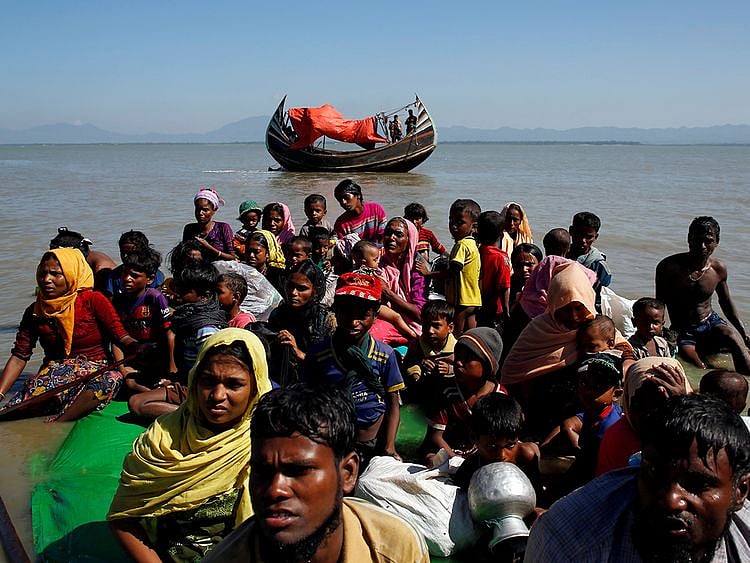World’s refugee problem is completely man-made
One never heard of Iraqi refugees in hordes before the invasion of the country by West

Refugees all over the world today are being looked at as pariahs in the countries they have forcibly chosen as their adopted homes. In many cases, they have even been brutally evicted from within national borders and subjected to humiliation and cruelty.
Notwithstanding the fact that the hordes of refugees include women and children uprooted from their own homes because of conflict by others, they simply seek some solitude and a safe place to stretch their weary bones.
Wars and conflicts by politicians and rulers have wreaked havoc on the civil society that once prevailed in their lands. From countries in Africa including Chad, Somalia and Libya, to Iraq and Syria in the north, from Yemen, Palestine to Afghanistan and Myanmar in the east, conflict has destroyed any sanctity of home and dwelling for thousands of individuals whose only hope and salvation was to brave attempts to sneak into neighbouring European countries.
Take Iraq for that matter. One never heard of Iraqi refugees in hordes before the invasion of the country on the pretext of weapons of mass destruction. Bombs were being dropped on children, on old men and women in the desert. In the city of Fallujah, hospitals had been bombed. There was no hope of evacuation as there was no longer a safe haven anywhere. Overnight, children were becoming orphans, as cluster bombs and mortar fire rains all around.
Besides their lands being stolen, so was their sovereignty. In the process, hundreds of thousands of Iraqis lost all sense of security as the country descended into chaos.
Afghanistan suffered from a conflict that had stretched over decades when first the Soviets took it upon themselves to invade the country back in 1979 under the pretext of upholding the Soviet-Afghan Friendship Treaty that had been signed a year earlier. With Afghanistan bordering the Soviet Union and an unfriendly leader in Kabul, the Soviets decided to take matters into their hands and Russia begins a massive military operation, sending in an estimated 280 transport aircraft and three divisions of almost 8,500 men each.
The subsequent 10-year war that was aptly termed as ‘Russia’s Vietnam’, with the country sending in thousands of troops, spending millions, and ultimately retreating gave rise to millions of Afghans who found themselves homeless and nowhere to go. Many escaped to neighbouring Pakistan or Iran or tried the long and arduous road trek to distant European countries. The significance of the Soviet invasion was that it helped create the terrorist and extremist groups that are still in place today.
Following the Soviet departure, the Afghan people began assembling their lives back to some semblance of normality when another invasion by the US and allied forces attacked the country back in 2001. That incursion resulted in hundreds of thousands more refugees who had to flee somewhere.
In Yemen, the Houthi adventure against the elected government has created another man-made misery with an estimated half a million homeless and destitute people looking to flee somewhere. The civil war in Syria destroyed a once flourishing Syrian society that prided itself in self-sufficiency and education. Hordes of Syrians had to flee, many losing dear family members along the way as they tried to escape on foot, by boot, or any other means available.
In Somalia, a civil war that began in 1991 has ravaged the country ever since. The civil war began as armed resistance to the governing regime, which then grew into a much larger conflict between various competing factions after the overthrow of the government. Continuing armed conflict, lack of state protection, and countless instances of humanitarian crises have led to more than 2.6 million refugees, many barely eking a daily existence living unassisted and vulnerable to abuse.
In Myanmar, the brutality of the sectarian conflict between the ruling junta along with and majority Buddhist populace against the Rohingya minority has led to the displacement and internment of millions of Burmese Muslims, many of who had to flee on foot to neighbouring Bangladesh.
Copy and paste such similarities elsewhere in Venezuela, Libya, Palestine, South Sudan, and other places of conflict and one gets to understand that it really is not the refugee who is to blame. The refugees did not bring it upon themselves. It has been the need for power or conquest or profit or avarice that has subjected these unfortunate souls to a status of being homeless and seeking safety elsewhere.
Can they really be blamed for wanting to stay alive?
Tariq A. Al Maeena is a Saudi sociopolitical commentator. He lives in Jeddah, Saudi Arabia. Twitter: @talmaeena
Sign up for the Daily Briefing
Get the latest news and updates straight to your inbox
Network Links
GN StoreDownload our app
© Al Nisr Publishing LLC 2026. All rights reserved.